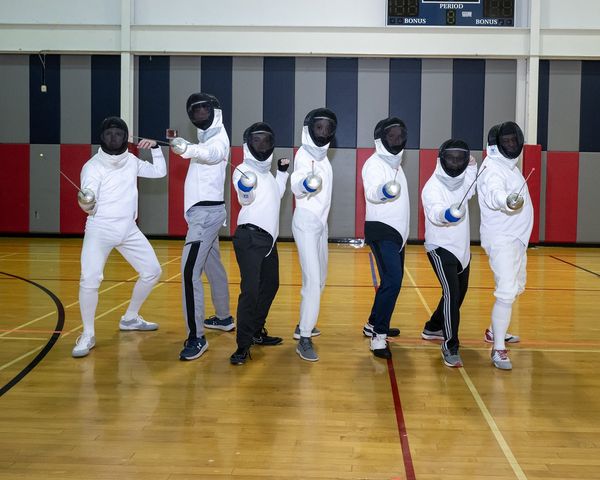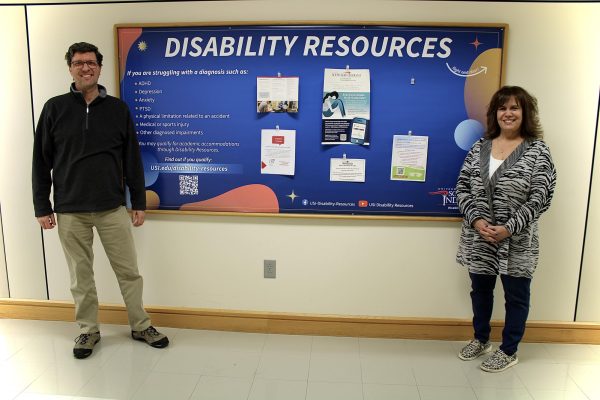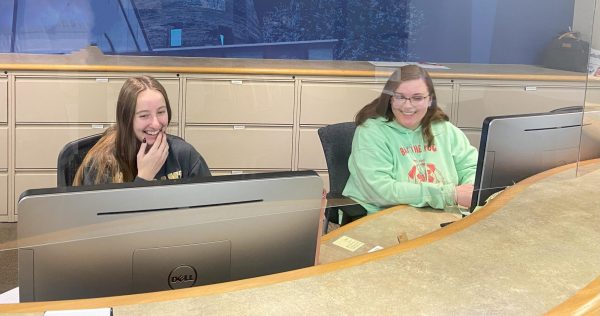Battling between hope and addiction
Student overcomes drug addiction, finds purpose
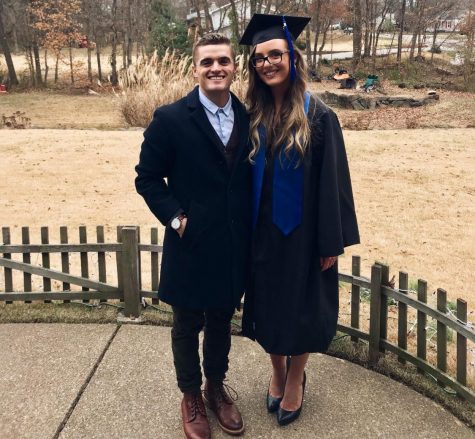
Will Haas, a senior psychology major, and Samantha Haas smile after Samantha’s graduation from USI last year.
Will Haas was 17 years old when he decided to try OxyContin for the first time.
The smell of cigarettes and fuel surrounded the garage room as a line of OxyContin was distributed on the used CD case that sat on the worn out ping pong table.
The group of older high school kids handed Haas a straw and told him they had a line of OxyContin on the table for him.
“From there it went from once every three weeks to once every two weeks to once a week, to two times a week, to four times a week, to every day,” Haas said.
The senior psychology major’s addiction lasted until he was 21 years old when he began failing more than half of his classes during his first semester at USI.
“Most people don’t want to get clean,” Haas said, “It’s not that they don’t want to, but it’s like ‘what’s the point? All these things have happened to me’ or ‘I have lost this, this and that’, and you’re pitying yourself, but in a way, you have just seen the bad that has happened to you.”
Haas didn’t realize the damage that he was causing himself.
“You find yourself just needing something, to eat or to even just love your family,” Haas said.
According to altamirarecovery.com, drug addiction is an extensive problem that greatly impacts addicted people as well as their families and society. Addiction affects people in all walks of life, and it leads to problems that can include financial burdens, relationship difficulties, and an inability to keep up with work, school and family responsibilities.
“Addiction doesn’t discriminate,” Haas said. “I came from a middle-class family, so we weren’t poor but we weren’t rich. I had great positive family support so you can’t say ‘every drug addict comes from a bad family’ because mine was stable.”
Haas always knew about rehab and only became more curious about the process once he began questioning change.
“I think being on campus, a part of my old self was like ‘maybe you need to change something,” Haas said. “I remember just wanting a normal life again.”
A week after his 21st birthday he decided to put himself in rehab at Brentwood Springs, which is a facility that specializes in inpatient and outpatient treatments.
When Haas told his parents about his need to go to rehab, they were shocked.
“I sat my parent down in the front room of our house, it was dark outside, kind of chilly, I remember when I told my parents that I was addicted. The environment was suitable for what I was going to share because I didn’t want to be seen in that moment,” Haas said. “They weren’t mad or modified, but they were shocked.”
Haas’s parents had been aware of the dabbling with drugs, however, there is a difference between dabbling and beings physiologically addicted.
“My heart was pounding when I told them. I was nervous,” Haas said. “It is not the proudest day of your life telling your parents that you are a drug addict.”
During Haas’s detoxifying process he was held in the hospital for a few days.
According to recovery.org drug and alcohol treatment often begins with detox, which is the process of allowing any toxins to leave the body while managing withdrawal symptoms. Detox can be done on an inpatient or outpatient basis. It usually includes three stages: evaluation, stabilization and transitioning to treatment.
Will said that he was in detox for 10 days.
“I was hospitalized while I was in there because I was coming off of two drugs, and my body was dying, I hadn’t eaten or drank anything for three days, and I couldn’t receive any medication,” Haas said.
Haas said he felt he had reached rock bottom.
“They put me in this chair, and pushed me out into the main hall, and they give me a bucket and I’m just staring at the lights thinking to myself, ‘how the fuck did I get here?’” Haas said.
Haas said he had to finally begin dealing with his problems.
According to the Synthesis project, there is a high correlation between drug addiction and mental illnesses such as anxiety and depression.
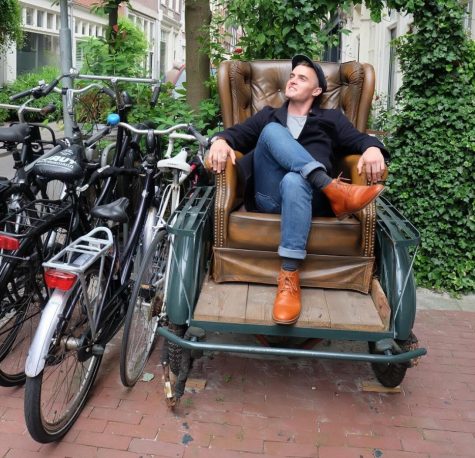
Will Haas, a senior psychology major, poses on a chair while studying abroad in Besançon, France.
“They are medicating for things that they should be seeing a doctor for and if they had the proper medical attention then they could actually avoid all of this, potentially,” Haas said.
As Haas got further into his recovery journey, USI became a place of routine and structure for him.
“For me, it was doing well in school and having professors that were so involved in my life, that for me was nice, I don’t want to say escape but reward that I wasn’t used to having,” Haas said.
Haas said that school became a different kind of high for him.
“Accomplishing something that brings you a good type of sensation that isn’t artificial,” Haas said.
Haas will graduate in spring 2019 and will attend grad school abroad at Swansea University, in order to help drug abuse victims.
Haas wants to create a facility that helps victims integrate back into life outside of the rehab.
“This would be a facility they can go to school or work from but have structured group sessions and a program to give addicts the skills needed to cope with challenges. This is the reason I am going to graduate school and I hope to create a facility such as this myself,” Haas said.
The first person Haas told about getting into grad school was his sister, Samantha Haas.
“She was in the LA computer lab downstairs, I walked up to her and was like ‘hey I got accepted into grad school,’ and she just started crying and gave me a big hug,” Haas said.
Samantha said that Haas’s journey has been ‘absolutely surreal’ every step of the way.
“If I look back and see how far he has come in such a short period of time, it is just unreal, and it would make me say to anyone that has a family member that is going through drug addiction or is going through it that there is always hope,” Samantha said.
Samantha said that every day was an emotional roller coaster due to the unique traits that were masked by Haas’s addiction.
“Getting Will back and clean was a dream come true and everything that he has accomplished through school has been the cherry on top,” Samantha said.
Haas said that it was a small percentage of hope that pulled him out of his drug addiction.
“You can’t underestimate the power of a bit of hope, (and) a bit of aspiration,” Haas said. “It allowed me to live again.”






